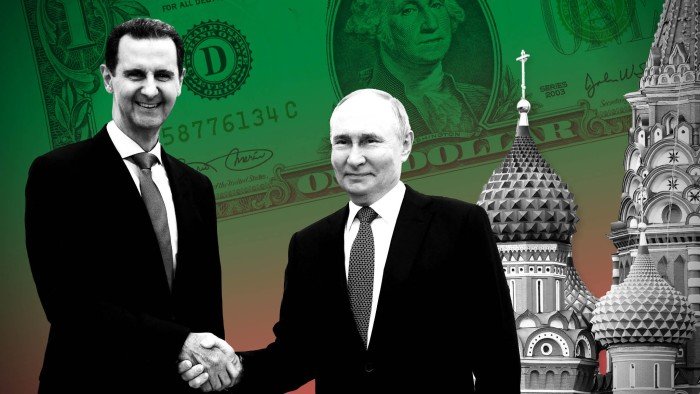Bashar al-Assad’s central bank flew around $250 million in cash to Moscow over two years as the then Syrian dictator owed the Kremlin military support and his relatives secretly bought assets in Russia.
The Financial Times has uncovered records showing that, despite being desperately short of foreign currency, Assad’s regime dumped banknotes weighing almost two tonnes in the form of $100 bills and €500 bills between 2018 and 2019 Moscow’s Vnukovo airport to be deposited into sanctioned Russian banks.
The unusual transfers from Damascus underscore how Russia, a key ally of Assad that gave him military support to extend his regime, became one of the main recipients of Syria’s money as Western sanctions pushed it out of the financial system.
Opposition and Western governments accuse the Assad regime of plundering Syria’s wealth and using criminal activities to finance the war and its own enrichment. The cash shipments to Russia coincided with Syria’s reliance on military support from the Kremlin, including from Wagner Group mercenaries, and the start of a luxury real estate buying spree by Assad’s extended family in Moscow.
David Schenker, who served as U.S. assistant secretary of state for Near Eastern affairs from 2019 to 2021, said the transfers were not surprising given that the Assad regime regularly sends money out of the country for “a combination of securing their… ill-gotten gains and…”to achieve Syria’s legacy abroad.”
“The regime would have to take its money abroad to a safe haven so that it could use it to provide a good life for the regime and its inner circle,” he said.
“Russia has been a haven for the Assad regime’s finances for years,” said Eyad Hamid, senior researcher at the Syrian Legal Development Program, noting that Moscow has become a “hub” for evading Western sanctions that have been imposed after Assad brutally suppressed an uprising in 2011.
Assad’s flight to Moscow as the rebels approached Damascus has even angered some former regime loyalists, who see it as evidence of Assad’s overarching self-interest.
His shaky rule was bolstered by Iran and its proxy militant groups, which intervened in 2012, and Russia, which used its warplanes to crush the remnants of Syrian rebels and Islamist insurgents in 2015.
Syria’s ties with Moscow deepened dramatically as Russian military advisers bolstered Assad’s war effort and Russian companies became involved in Syria’s valuable phosphate supply chain. “The Syrian state could pay the Russian state for military intervention,” said Malik al-Abdeh, a London-based Syrian analyst.

The Assad regime moved large shipments of US and Euro banknotes to Russia between March 2018 and September 2019.
Russian trade records from Import Genius, an export data service, show that on May 13, 2019, a plane carrying $10 million in $100 bills sent on behalf of Assad’s central bank landed at Moscow’s Vnukovo airport.
In February 2019, the central bank flew in around 20 million euros in 500 euro notes. In total, from March 2018 to September 2019, there were 21 flights with a declared value of over $250 million.
According to records starting in 2012, there were no such transfers of funds between the Syrian central bank and Russian banks before 2018.
A person familiar with Syria’s central bank data said foreign reserves were “almost nothing” in 2018. However, due to the sanctions, the bank has to make payments in cash, they added. It bought wheat from Russia and paid for money printing services and “defense expenses,” the person said.
They added that the central bank would pay according to “what is available in the vault.” “When a country is completely surrounded and sanctioned, all they have is cash,” the person added.
Russian records show that in previous years there had been regular exports from Russia to Syria – such as deliveries of security paper and new Syrian banknotes from the Russian state printing house Goznak, as well as deliveries of Russian military spare parts to the Syrian Ministry of Defense and after the large quantity of banknotes was flown to Moscow.
However, there is no record of the two Russian lenders that received the notes from Damascus in 2018 and 2019 accepting further shipments of cash from Syria or any other country over a ten-year period.

Although Syria’s treasury has been devastated by the war, Assad and his close associates have taken personal control of critical parts of the country’s shattered economy over the past six years, people with insight into the regime’s workings say.
First Lady Asma al-Assad, a former JP Morgan banker, built a strong position Influencing international aid flows and leading a secret presidential economic council. According to the US, Assad and his followers also earned income from international drug and fuel smuggling.
Hamid of the Syrian Legal Development Program said that “corruption under Assad was not a peripheral issue or a side effect of the conflict. It was a form of government.”
Money transfers from Syria had previously drawn sanctions from Washington. The U.S. Treasury Department in 2015 accused Syria’s former central bank governor Adib Mayaleh and a central bank official named Batoul Rida of facilitating large cash transfers for the regime to Russia and managing fuel deals to raise foreign currency. Rida was also accused by the US of trying to obtain the chemical ammonium nitrate from Russia, which is used in barrel bombs.
Records show that the cash delivered to Moscow in 2018 and 2019 was delivered to Russian Financial Corporation Bank (RFK), a Moscow-based Russian lender controlled by Rosoboronexport, the Russian state-owned arms export company.
The U.S. Treasury Department imposed sanctions on the bank this year for facilitating cash transfers, which enabled “millions of dollars in illicit transactions, foreign exchange transfers and sanctions evasion schemes benefiting the Syrian government.”
Records show that in March 2018, Syria’s central bank also transferred $2 million to another Russian bank, TsMR Bank, which was also sanctioned by the US.
As Russian financial institutions received cash from Syria, Assad’s other international backer, Iran, set up plans to inject hard currency into the beleaguered regime. According to company documents analyzed by the FT, Assad’s main financial backers held important positions in these companies.
Yassar Ibrahim, Assad’s closest economic adviser, is a shareholder in a Lebanese company called Hokoul SAL Offshore alongside his sister Rana, who has also been sanctioned by the US.
According to the US Treasury Department, Hokoul is ordered by Iran’s Revolutionary Guard-Quds Force and the Lebanese militant group Hezbollah to move hundreds of millions of dollars “for the benefit of the brutal Assad regime.” Ibrahim’s role in the company has not been reported.
As the chain of Western sanctions forced the regime out of the dollar banking system, corporate filings analyzed by the Financial Times show that key Assad lieutenants continued to transfer assets to Russia.
In 2019 reported the FT that Assad’s extended family had purchased at least 20 luxury apartments in Moscow beginning in 2013 using a complex series of companies and loan arrangements.
And as recently as May 2022, Iyad Makhlouf, Assad’s maternal cousin and a Syrian intelligence major who allegedly monitored, repressed and murdered citizens, founded a real estate company in Moscow called Zevelis City, which was owned by his twin brother Ihab and called Zevelis City, according to Russian company records show .
Iyad’s brother Rami Makhlouf was the regime’s top businessman, once believed to control more than half of Syria’s economy through a web of companies including the SyriaTel mobile phone network. But after Rami fell out of favor with the regime in 2020, Syrians with insight into the regime say Iyad and Ihab remained close to Bashar and his wife Asma.
Company records show that Zevelis City was founded by a Russian associate of U.S.-sanctioned Syrian-Russian banker Mudalal Khoury, who was accused by the U.S. of facilitating large movements of money from Syria to Russia on behalf of the Assad regime.
Khoury appears to have played a crucial role in entrenching the regime’s interests in the Russian financial system, and in 2015 the US Treasury Department stated that Khoury “has a long association with the Assad regime and the regime’s business and financial interests.” represented in Russia”.
Schenker said that given the pressure Assad has faced for more than a decade from Western governments, particularly the United States, “Assad always knew that he would never be an acceptable companion in Paris, for example.”
“He didn’t want to buy homes there, but he also knew that if this ended up here it would end badly. So they had years to raise money to build systems that would be reliable safe havens.”





